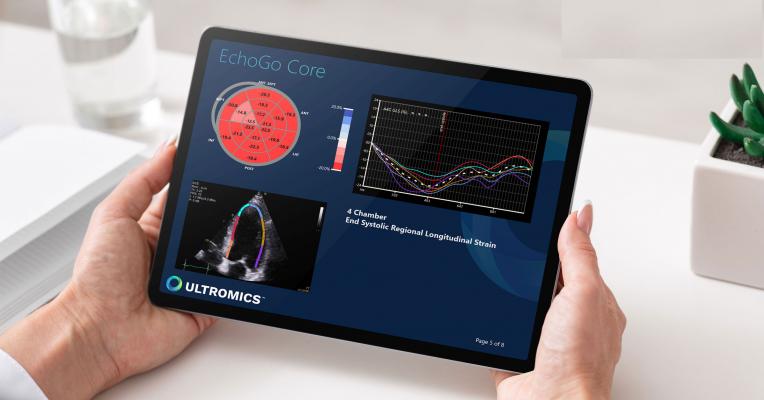
The WASE-COVID Study used the artificial intelligence automated echocardiogram reading software EchoGo-Core from Ultromics to evaluate ejection fraction and left ventricle longitudinal strain in COVID-19 patients to identify risk markers for mortality. The study also compared human vs. AI variability in assessing the exams.
May 18, 2021 — Artificial intelligence (AI) derived heart measurements were able to predict COVID-19 (SARS-CoV-2) mortality on echocardiograms in an international cardiac ultrasound study of COVID-19 patients. The Echocardiographic Correlates of in-hospital Death in Patients with Acute COVID-19 Infection: The World Alliance Societies of Echocardiography (WASE-COVID) Study was presented at the American College of Cardiology (ACC) 2021 virtual Scientific Session.
This international effort was supported in partnership by the American Society of Echocardiography (ASE), MedStar Health, University of Chicago and AI-vendor Ultromics.
This study looked at the crossover between COVID-19 and cardiac measurements among 870 patients from 13 medical centers in nine countries – Asia, Europe, United States, Latin America. Federico Asch, M.D., director of the cardiovascular and echo core labs at MedStar Health Research Institute, and Roberto Lang, M.D., director of the University of Chicago's noninvasive cardiac imaging laboratory, served as principal investigators.
"Our original WASE Study first set out to see the state of healthy Normal hearts across the world. It took us a few years to manually review all of that data," Asch said. "When the pandemic began, we knew that the clinical urgency to learn as much as possible about the cardiovascular connection to COVID-19 was incredibly high, and that we had to find a better way of securely and consistently reviewing all of this information in a timely manner."
"Knowing we had to move quickly to figure out if there was anything about heart health that we could associate with COVID-19 outcomes, we were motivated to secure an industry partner to help accelerate our analysis timeline," Lang explained. "Using Ultromics' software to anonymize echocardiograms, upload them to a cloud platform, and use artificial intelligence to quickly and accurately analyze each exam was hugely beneficial in bringing this report forward while the world is still fighting this virus."
Compared to previous studies that have identified coronary artery disease, hypertension, and diabetes as cardiovascular comorbidities, this study validated those findings and identified which cardiac measurements and biomarkers were the best predictor of adverse outcomes.
Key WASE-COVID Study Findings
• 10 of the 13 medical centers performed limited cardiac exams as their primary COVID in-patient practice, and just 3 out of the 13 centers performed comprehensive exams.
• In-hospital mortality rates varied by region, 11% in Asia, 19% in Europe, 27% in Latin America, and 26% in U.S.
• Left ventricular longitudinal strain (LV LS), right ventricle free wall strain (RV FWS), in addition to age at presentation, lactic dehydrogenase (LDH), and previous lung disease were independently associated with mortality, while left ventricle ejection fraction (LVEF) was not.
• Fully automated quantification of LVEF and LVLS using AI minimized variability.
• AI-based LV analyses, but not manual, were significant predictors of in-hospital and follow-up mortality.
"Global health equity is an issue that COVID-19 has highlighted, and this study has helped further demonstrate this while investigating the predictive power of cardiac markers," said Ross Upton, Ultromics CEO. "As we continue to study the significance of cardiac involvement in COVID, we can use these critical findings to optimize cardiac care for patients going forwards."

About Ultromics
Ultromics provides fully automated, cloud-based, artificially intelligent software as a service solutions that empowers clinicians to make fast, accurate decisions when using ultrasound images to diagnose cardiovascular disease. Born at the University of Oxford and built-in partnership with the U.K.'s NHS, Ultromics has developed the first fully automated solution for echocardiography analysis. Ultromics delivers analysis within minutes, with zero variability, without any disruption to workflow, and provides clinical decision support in the diagnosis of coronary artery disease. Ultromics has partnered with leading research institutions and medical association, including Mayo Clinic, Cleveland Clinic, and the American Society of Echocardiography.
For more information: ultromics.com
Find links to more ACC 2021 late-breakers
Find more COVID-related cardiology content
Photo Gallery Shows COVID Presentations on Medical Imaging


 July 31, 2024
July 31, 2024 









